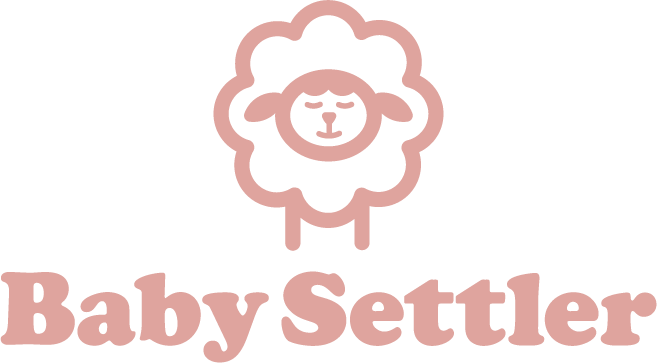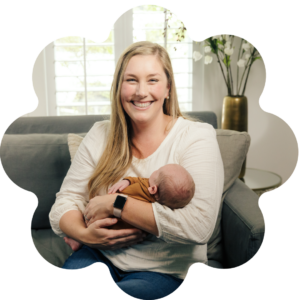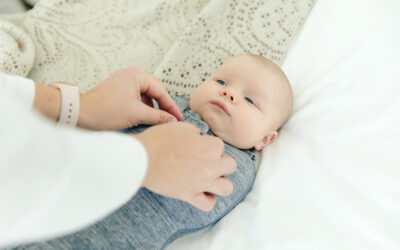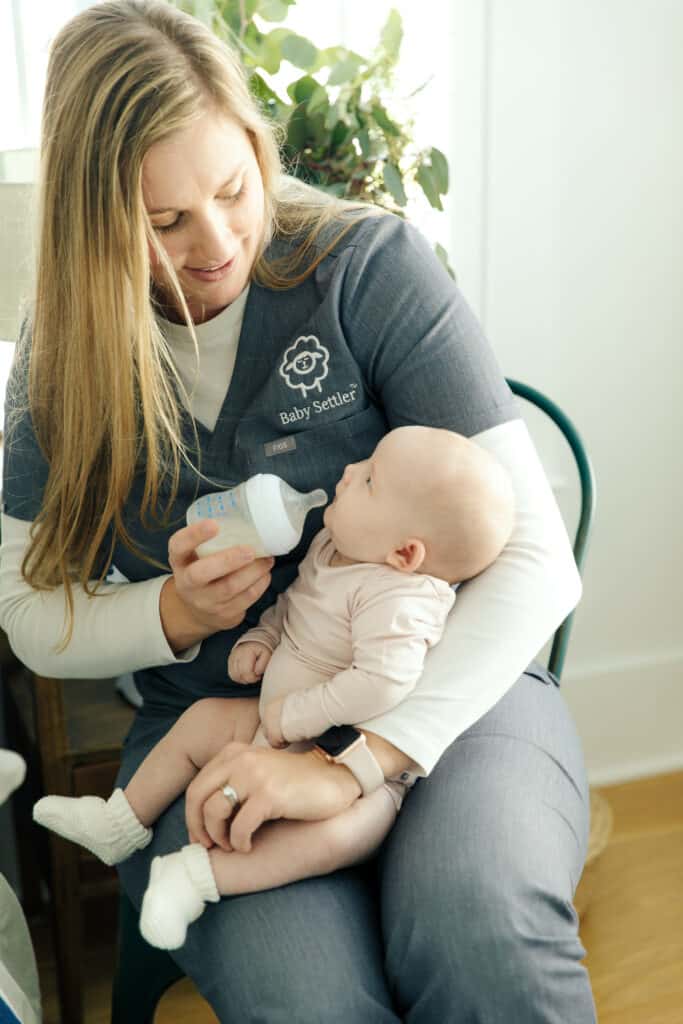
If you’re going through the process of sleep training your baby and encouraging them to sleep for longer at night, you probably came across the suggestion of feeding your little one formula. But, is this really the right route to take to lengthen nighttime sleep? And, does formula actually help babies sleep longer?
The Myth of Formula-Fed Babies Sleeping Longer at Night: Debunking This Misconception
Newborn babies are biologically programmed to wake up in the middle of the night for feedings. This is because they have tiny tummies so can only take a bit of milk at a time. Once your baby grows older and their digestive system is more developed, they’re able to take in more milk during feedings which results in longer nighttime sleep.
When it comes to formula, it is harder for little ones to digest which can keep them fuller for longer.
“A study in 2017 found that three-month-old babies fed breast milk during the first few months of their life slept more during the night than their formula-fed counterparts…” tells The Sleep Doctor.
Breast milk that is produced at night actually contains a magic ingredient: Melatonin, a hormone associated with sleep. Babies cannot produce this hormone on their own during their first few months of life. So, the melatonin in breast milk can help regulate babies’ circadian rhythms (the internal biological clock that regulates sleep-wake cycles).
While formula won’t necessarily promote better sleep, feedings do still play a huge role.
How Feedings Impact Your Baby’s Sleep
Feeding and sleep are connected. Effective, quality, efficient feedings promote better sleep. And good sleep promotes better feedings – they work together. To fit these two pieces together, it’s important to lay down the proper sleep foundations for your baby:

Differentiate Between Daytime And Nighttime Feeds
This is key! Feeding your baby during the day versus at night needs to be treated differently so that your little one knows what happens next.
During daytime feeds unswaddle your baby, feed them in a light-filled environment, change their diaper afterward, and follow it up with a wake window.
During nighttime feeds, keep the lights low (including your cell phone!), keep your baby swaddled, leave the white noise machine on, change their diaper before the feed, and put them back in their crib to carry on sleeping.
Consistent Bedtime Routine
There are so many reasons why a baby’s bedtime routine is essential. Activities like a bath, a baby massage, and the last feed of the day can help your baby wind down and get ready for sleep. Babies are also fans of predictability, so a consistent bedtime routine promotes feelings of security which is very calming. Plus, a regular routine can help regulate your baby’s circadian rhythm.
Feed On Cue
Your baby tells you when they’re hungry – not with words, but with little cues. Smacking their lips, bringing their hands up to their mouth, and moving their head around are all signs that your little one is hungry. If they’re not fed, these cues get louder and your baby gets frustrated. “It is much easier to get a calm and quiet baby latched onto the breast for a breastfeed than a very upset baby. Also, responding to early feeding cues has been shown to keep your milk supply up, satisfy your baby’s hunger and thirst and reassures your baby that you are there when they need you,” explains Medela.
Optimal Sleep Environment
Your baby’s nursery or sleep environment can help them sleep through the night. A soothing sleep environment is cool, dark, and comfortable. Create this with:
- Blackout curtains or blinds
- A white noise machine (you could also use a fan)
- Comfy bed sheets and sleep attire
One of the best things in which to put your baby to bed is a swaddle or sleep sack. “Swaddling mimics the feeling babies get when they’re in the womb. They feel snug and secure wrapped in a comfy blanket… The idea is that if an infant’s arms stay snuggly wrapped in the swaddle, the baby won’t wake up suddenly from the startle reflex. Babies and parents may be able to snag some extra sleep,” says Healthline. However, the American Academy of Pediatrics advises that parents stop swaddling babies when they reach two months.
Full feeds, Reduce Snacking
One of the best things you can do to promote longer sleep is full feeds. Babies can “snack” which means only taking in a little bit of milk when they’re overtired. This results in your baby getting hungry again sooner.
To promote full feeds, you can:
- Feed your baby at the beginning of their wake window
- Offer both breasts
- Follow baby’s cues when determining how many ounces to offer at each feed
- Follow hunger cues
- Burp baby before, during, and after each feed.
- Look for baby to relax their hands, a sign that they’re satisfied
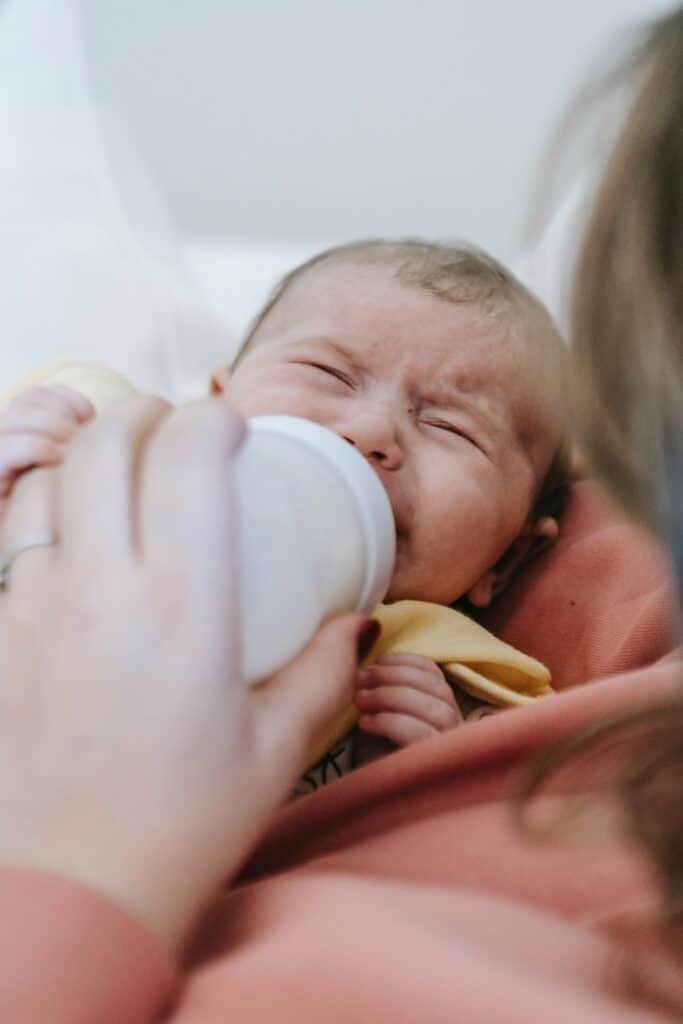
Tips For Formula
Of course, breastfeeding isn’t always advisable. Even though formula specifically isn’t the answer to your baby’s sleep, it still might be the right choice. There is no shame in not breastfeeding your baby. In fact, there are some circumstances when choosing to bottle and formula feed is the best decision for you and your little one. Sore nipples, engorgement, clogged milk ducts, and infections are just some of the reasons why breastfeeding doesn’t work for many mamas.
There are different ways to go about feeding your little one formula: One being strictly formula and no breast milk, the other being a combination of both (yes, you can mix breast milk and formula!).
If you’re unsure about the feeding path you should take or are interested in combo feeding, but unsure about a routine that will protect your supply, book a lactation consultation with us! We can discuss all of the factors above to create a plan that works for you and your baby.
There is no single magic move that will help your baby sleep for longer at night. Quality nighttime sleep rests on a strong foundation of full feedings (breast milk or formula), a consistent bedtime routine, and an optimal sleep environment. When all these pieces fit together, both you and your baby will benefit.
